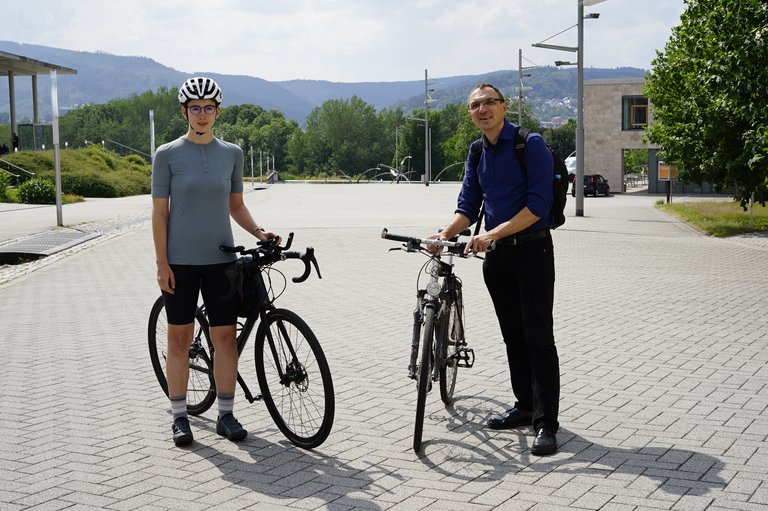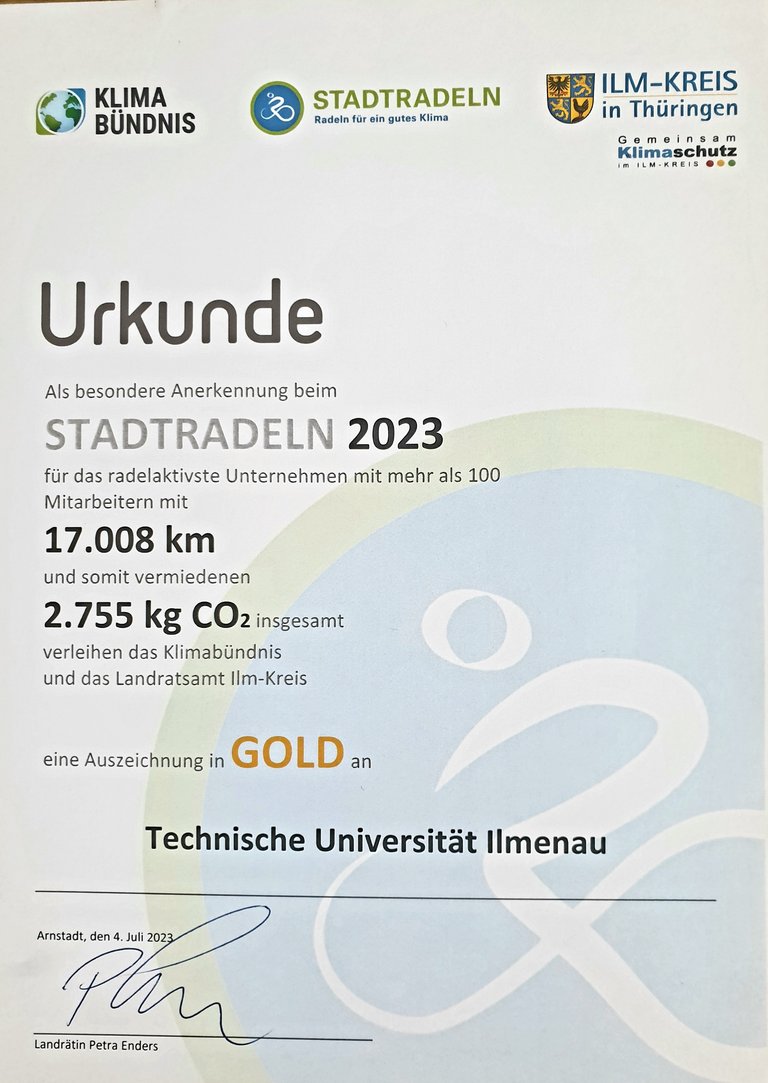For their commitment and sporting achievements in the Climate Alliance's "Stadtradeln - Radeln für gutes Klima" ("Cycling for a Good Climate" ) campaign, the participating employees and students of TU Ilmenau were honored at a ceremony in Stadtilm on July 4. With a total mileage of just over 17,000 kilometers, the university's team came out on top among the participating Ilmenau companies for the highest number of kilometers traveled. This corresponds to a CO2 saving of 2755 kilograms. This year, 96 cyclists from the university were active and made their own personal contribution to health, quality of life and climate protection in the Ilm district - ten more than last year.
Cycling for a good climate: students and employees receive awards in the "Stadtradeln" campaign

According to the Federal Environment Agency, more than one-fifth of climate-damaging carbon dioxide emissions in Germany are caused by traffic. According to the Federal Statistical Office, cars and motorcycles alone accounted for 61% of carbon dioxide emissions in EU-wide road traffic in 2020. Conversely, cycling and walking can save around 140 g of greenhouse gas emissions per person-kilometer compared to cars and reduce air pollutants that are harmful to health. The climate alliance Stadtradeln provides information about this on its website and once a year calls on citizens to make as many everyday journeys as possible by climate-friendly bicycle.
For 21 days in May, scientists, employees and students at Ilmenau University of Technology left their cars behind in favor of bicycles, including department head Prof. Johann Reger and Anna Keune, a master's student in technical cybernetics and systems theory. For Prof. Reger, however, this was nothing special:
I haven't had a car for 23 years, I ride my bike a lot, and I'm more aware of how much of our traffic is geared towards cars. City cycling is very good for drawing attention to this!
That's why the university professor also promoted his participation among his students in advance and founded his own subteam called "Putting energy back in control." "Many people in my department are very active in sports, and I wanted to support that," says Prof. Reger, who also acted as captain of the team: "I specifically approached students in cybernetics to see if they would like to join in. That worked out great for Ms. Keune, among others."
"Cycling is an excellent way to balance out the daily routine of studying," says the student, explaining her motivation:
Cycling in the city as part of a team is also a great incentive to log kilometers with fellow students.

Anne Keune cycled a total of 1555 kilometers, the most at TU Ilmenau. With 5803 kilometers, her team was the most active group at the university, ahead of the "Optik-Eule" team with 1680 kilometers and the Ilmkubator Gründerservice, which also achieved over 1000 kilometers. A total of 1796 citizens, children and young people took part in the city cycling event in Ilmenau this year and made their own personal contribution to health, quality of life and climate protection with 143,880 kilometers. With 844 cyclists and 143,880 kilometers, the Ilmenau teams accounted for almost half of all participants in the Ilm district.
For Anna Keune and Johann Reger, however, it was not only the sporting incentive and the team aspect that were decisive: "Most of the distances you cover are short anyway, and by that I mean 20 kilometers and more," explains Prof. Reger. He also sees the campaign as a sign of sustainable mobility - and an important step by the campus community toward becoming a Sustainable Community:
We should simply not have to use the car there, as is already practiced in the Netherlands. Since the city cycling is organized communally, the decision-makers are involved and also understand the associated statement politically.
Isaballa Liedtke from TU Ilmenau's health management, who initiated the participation of university members in the campaign, also sees the campaign as a contribution to health promotion:
Cycling strengthens the cardiovascular system, promotes endurance and strengthens muscles. At the same time, it has positive effects on mental health: cycling lowers stress levels and helps people relax. These are many good reasons to switch to cycling permanently. We are very pleased that so many people have once again taken part in the city cycling event and are thus doing something for their health as a matter of course.
Prof. Reger will definitely remain loyal to his bike even after the campaign is over:
I live in Erfurt and cycle to the train, then to the university. I can take the bike on the train for free. Why should I spend money on a car? Climate protection is already paying off!

